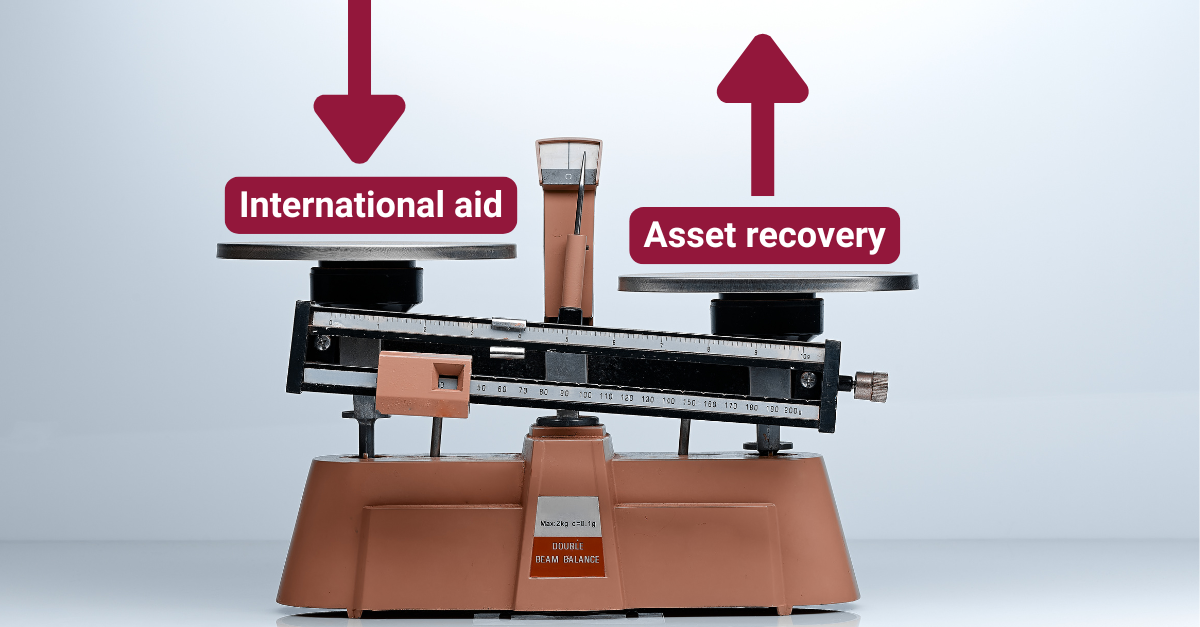Aid cuts make asset recovery even more crucial

State parties to the UN Convention Against Corruption are already obligated to identify, confiscate and return proceeds of corruption and money laundering that have entered their financial systems. As this often includes money stolen from states receiving development aid, maximising efforts to fulfil this obligation could offset some of the worst effects of recent aid cuts.
Aid cuts are hitting the most vulnerable
Countries across the globe have drastically cut their aid budgets in the last few months. The US government’s decision to pause and then terminate almost all of its USAID-funded projects is certainly the most significant illustration of this, but it is not an isolated example. Last month, the UK decided to significantly cut its overseas aid budget to fund an increase in defence spending. Similarly, France is looking to decrease its foreign aid by 37 percent, while Switzerland's international development budget is also being squeezed. Countries including Belgium, Germany, the Netherlands and Sweden have all made comparable announcements.
The damage to vulnerable communities caused by global cuts to aid is already presenting itself. In Ethiopia, food assistance has halted for more than a million people. From May, charity groups will be forced to stop treating tens of thousands of malnourished children in the Democratic Republic of the Congo. The predicted long-term effects of these cuts are also alarming. The World Health Organization recently stated that the US funding cuts could cause three million HIV-related deaths alone.
This post is not intended to comment on whether the decision to reduce foreign aid is moral or even politically prudent. Instead it argues that countries that cut foreign aid should, at the very least, better fulfil existing international obligations that would help mitigate the negative impacts of these cuts.
An increased responsibility to recover stolen assets
One such action that countries can take is to maximise their efforts to identify, confiscate and repatriate the proceeds of corruption that have been stolen from aid-dependant countries and placed within their own financial systems.
Credible statistics on the total proceeds of corruption are impossible to find. But even the most conservative attempts to gauge the amount of proceeds concealed within global financial centres measure the amount in units of billions, if not significantly more. Considering that:
- These corrupt proceeds are often sitting in the financial systems of states that are currently cutting aid budgets;
- A good portion of these proceeds have been stolen from aid-dependant countries; and
- These proceeds lawfully belong to such aid-dependant countries;
Then there is a very strong argument that “financial centre” states now have an exponentially heightened responsibility to identify and return such stolen funds.
Every state that has signed the UN Convention Against Corruption has already committed to doing this. Now more than ever, they need to follow through.
Returned stolen assets could address critical needs
While any returned funds will not make up for the total amount of aid that has been cut, the impact that they could have is potentially enormous.
In the last three years, for example, Switzerland has repatriated USD 313 million in illicit proceeds to Uzbekistan via a specifically designed UN fund. These funds are more than twice the total amount of aid Switzerland has granted to Uzbekistan in the last three decades and have already been put towards efforts to reduce maternal and infant mortality and to finance education programmes.
Even the return of much smaller amounts of illicit proceeds can have a significant impact addressing urgent needs. In 2022, GBP 3 million in corrupt funds concealed in Jersey were repatriated to Kenya and put towards the country’s emergency response to Covid-19.
These are just a couple of cases. There are countless more yet to be identified globally that would involve similar sums.
Challenging but achievable
Of course, finding, confiscating and returning corrupt proceeds is a difficult task and will take time and effort. It may also require cooperation from agencies in aid-dependant countries in some cases. But this is all achievable. The process has been successfully navigated many times before, often leading to the mutual benefit of both countries involved.
On the one hand, countries with financial centres are able to fulfil international commitments to purge their jurisdictions of corrupt proceeds. And on the other hand, aid-dependant countries have funds returned that can then be utilised for their populations.
With some support and technical assistance, these countries are even often empowered to navigate these processes again on their own initiative to pursue additional funds that have been stolen and placed in further jurisdictions.
At the very least, if states cutting aid redouble their efforts to facilitate the return of such funds, it will allow aid-dependant countries to use them to address some of their most pressing needs in the current difficult environment. While this may not completely cover the immense financial shortfalls these vulnerable countries are currently facing, it would certainly provide some critical funds to communities where every drop in the bucket counts.
Related reading
- Good practices in asset recovery legislation in selected OSCE participating States, Working Paper 51 by Andrew Dornbierer
- Compensating the victims of foreign bribery: UK legislation, practice and recommended reforms, Working Paper 55 by Sam Hickey
- Smarter use of confiscated assets would multiply their impact, by Simon Marsh



